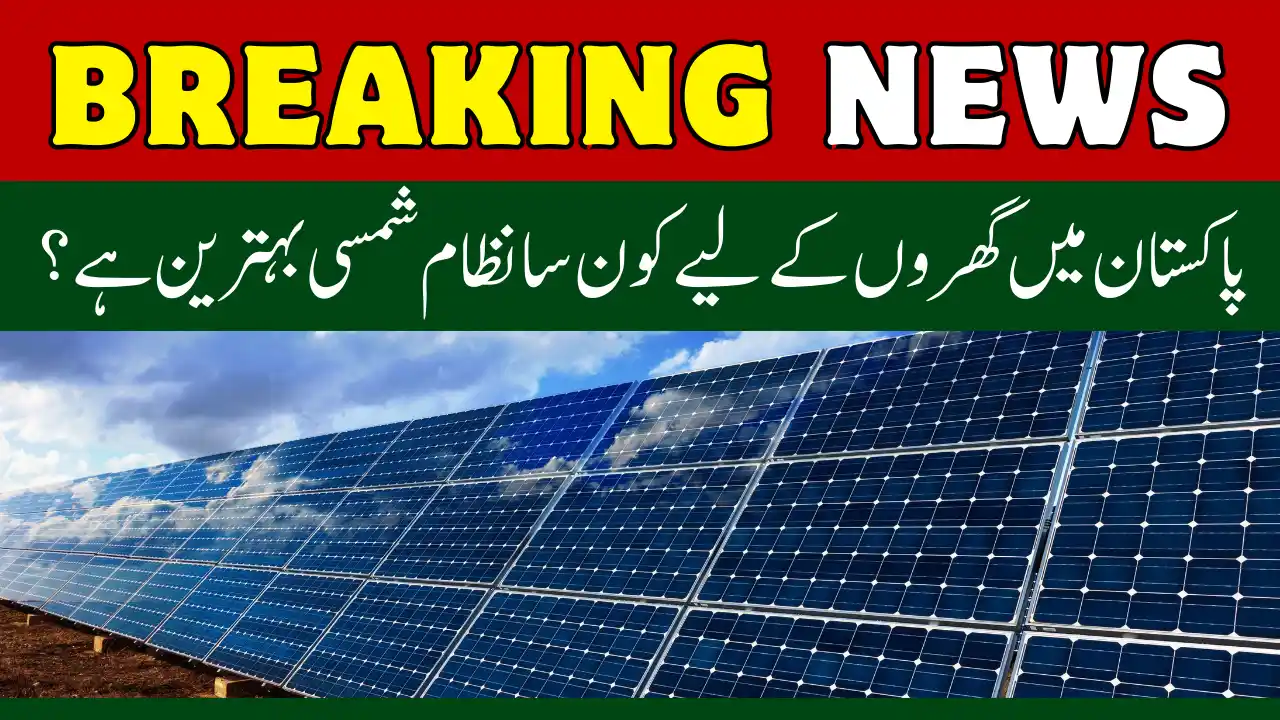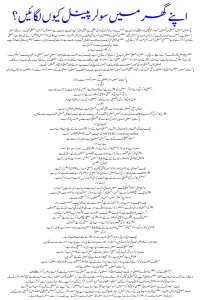Which Solar System is Best for Homes in Pakistan?
Pakistan has been facing an energy crisis for many years, largely due to the high cost of importing crude oil to power electricity generators. This crisis has led to soaring electricity costs for the average citizen. As a result, many are turning to solar energy as a more sustainable and cost-effective solution. In this article, we will explore the best solar systems available in Pakistan, offering detailed information to help you make an informed decision.
Quick Details Table
| KW Solar System | Monthly Unit Generation |
| 3 kW | 300 to 350 units |
| 5 kW | 500 to 600 units |
| 10 kW | 1100 to 1200 units |
| 15 kW | 1700 to 1800 units |
| 20 kW | 2300 to 2400 units |
| 25 kW | 2800 to 3000 units |
| 30 kW | 3500 to 3600 units |
| 35 kW | 4000 to 4200 units |
Why Install Solar Panels in Your Home?
In Pakistan, electricity prices are unpredictable and inflation is on the rise, making life increasingly difficult for the average person. In many regions, access to electricity is not available 24/7, even in the 21st century. Solar panels offer a reliable, cost-effective solution to these issues, providing a consistent power supply while reducing monthly electricity bills. Solar energy is also a clean, renewable source, making it an environmentally friendly option that reduces your carbon footprint.
Solar Panels: An Overview
Solar panels work by converting sunlight into electricity through the photovoltaic effect, a phenomenon discovered in 1839 by French physicist Alexandre Edmond Becquerel. Solar cells within the panels are made of semiconductor materials like silicon, which generate an electric current when exposed to sunlight. The panels are encased in layers of protective material, with the bottom layer collecting and transporting the generated electricity.
In Pakistan, solar energy is increasingly used in residential, commercial, agricultural, and industrial sectors. Here, we will explore some of the top solar panel brands available in the country.
Top Solar Panel Brands in Pakistan
- Longi Solar
- Known for high-efficiency monocrystalline panels, with efficiencies exceeding 21%.
- Suitable for residential, commercial, and industrial applications.
- Durable with extended warranties ensuring long-term performance.
- Jinko Solar
- A globally recognized brand offering high-quality panels at competitive prices.
- Panels have around 22% efficiency, making them a viable choice for various power needs.
- Strong focus on technological innovation, with a significant presence in Pakistan.
- Canadian Solar
- A trusted brand known for producing reliable, high-quality solar panels.
- Offers a variety of panels, including monocrystalline and PERC technology.
- Emphasizes sustainability throughout the manufacturing process.
- JA Solar
- A leading producer of cost-effective, high-efficiency solar panels.
- Panels have an efficiency of around 21%, ideal for budget-conscious consumers.
- Continuously invests in R&D to improve panel technology.
- Risen Solar
- A rapidly growing brand offering high-quality panels at competitive prices.
- Panels achieve over 21% efficiency, suitable for diverse power requirements.
- Focuses on stringent quality control to ensure consistent performance.
- Trina Solar
- A global leader in solar panel manufacturing, committed to innovation and sustainability.
- Offers a range of panels, including high-efficiency monocrystalline and bifacial options.
- Prioritizes excellent customer service and technical support.
- Panasonic Solar
- A well-known brand with a reputation for quality and reliability.
- Panels have high efficiency, often exceeding 21%, and are known for their long-term durability.
- Though more expensive, Panasonic panels offer a premium user experience.
- SunTech Power
- Renowned for producing a wide range of solar panels for various applications.
- Panels have an efficiency of around 21% and are known for their affordability.
- Invests heavily in R&D to continually enhance panel efficiency and reliability.
- Hanwha Q-cells
- A South Korean brand known for high-quality solar panels.
- Q Cells panels are highly efficient, often exceeding 21.5%, and are built with durable materials.
- Prioritizes innovation and sustainability in manufacturing.
- AE Solar
- Produces high-quality panels for residential, commercial, and industrial use.
- Panels are known for their superior quality, reliability, and aesthetic appeal.
- Uses advanced technology like PERC to maximize output while minimizing power loss.
Advantages of Using Solar Energy in Pakistan
- Reduced Electricity Bills: Solar panels can significantly lower monthly electricity costs by harnessing free energy from the sun.
- Protection Against Rising Rates: Solar energy locks in your electricity costs for over 25 years, protecting against annual increases in grid electricity prices.
- Environmental Benefits: Solar panels generate clean energy, reducing reliance on fossil fuels and lowering your carbon footprint.
- Income from Net Metering: Excess solar energy can be exported to the grid, earning credits that can be applied to your electricity bill.
- Enhanced Power Reliability: Solar systems, combined with batteries, provide backup power during load shedding, ensuring a continuous electricity supply.
- Increased Property Value: Installing solar panels can enhance the resale value of your home, making it a smart investment.
Types of Residential Solar Panels
Monocrystalline Solar Panels
- Known for high efficiency, typically between 15% and 20%.
- Made from single-crystal silicon, they perform well in various weather conditions.
- Considered a premium product due to their higher efficiency and durability.
- Feature a rear passivation layer that increases solar absorption and power output.
- Efficiency rates range from 18% to 22%, making them increasingly popular.
Polycrystalline Solar Panels
- Introduced in 1981, these panels use multiple silicon crystals, offering newer technology.
- They are typically more affordable but slightly less efficient than monocrystalline panels.
Is It Time to Install Solar Panels?
Consider the following before installing solar panels on your roof:
- Sunlight Exposure: Ensure your roof receives direct sunlight for most of the day, especially at midday.
- Roof Type and Age: Solar panels typically last over 25 years. It’s best to install them on a modern roof to maximize your investment.
- Roof Area: Allocate 10-20 square meters of roof space per kilowatt of solar capacity. For a 5 kW system, around 100 m² is needed.
- Financial Considerations: High electricity rates and favorable net metering incentives can help you break even within 5-7 years.
Maintaining Your Solar Panel System
Regular maintenance is crucial for ensuring the longevity and efficiency of your solar panels. Here are some maintenance tips:
- Cleaning: Regularly clean the panels with a soft brush or sponge to remove dirt and debris. Avoid harsh chemicals.
- Shading: Check for objects that may cast shadows on the panels and remove or trim them as needed.
- Damage Inspection: Regularly inspect the panels for any cracks or damage, and have them repaired or replaced by a professional if necessary.
- Performance Monitoring: Track the electricity output of your panels. A significant drop in output may indicate a problem that needs attention.
- Professional Maintenance: Consider hiring a professional to perform routine inspections and maintenance to ensure optimal performance.
Solar energy offers a sustainable, cost-effective solution to Pakistan’s energy challenges. With careful consideration and proper maintenance, installing solar panels can provide long-term benefits, including reduced electricity bills, environmental sustainability, and increased property value.


